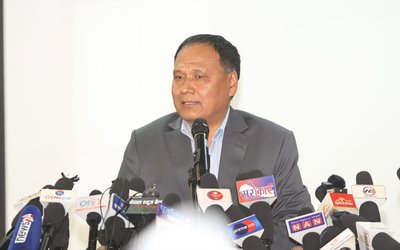It is but natural that we in Nepal have been and will always be influenced by what is happening and what has happened in India. It is no surprise because our cultures and mores have been intertwined over the centuries. Thus our actions become correlated by what was seen to be and what has been happening in the land of our big or now termed ‘elder’ brother. What the British left behind in India was the ‘First past the post Westminster System’ to be a part of the lives of the people here. Following the partition of 1947, India started with a Governor General and became a Republic in 1950 but the indirect election of the President was retained. This has been the situation in the former Colonial countries of South East Asia - namely Pakistan, Sri Lanka and Bangladesh. Burma, now Myanmar can be excluded as it was under military control for a long time.
Sri Lanka started at the time of independence in 1948 with a Parliamentary system which was changed to a Republican in 1972, and reconfirmed in 1978. Pakistan which had started with a Parliamentary system changed to a Presidential system under Zulfakir A Bhutto in 1971. Since then the power has shifted between the indirectly elected President and the Premier under the watchful eye of the army.
As one sees and hears CNN, one is bombarded by the images and speeches of Donald Trump and Hillary Clinton. Trump, a successful businessman stresses on the fact that he as an individual, is fighting against a system ‘rigged by the politicians’. One may not agree with his views but at least what he has pointed out certainly goes with the happenings in Nepal these days. The politicians of the post 1990 era, nay even post 1950, irrespective of whether they were working under the direction of the monarchs or so, have not been functioning at their best for the country. It is the same set of parties, sometimes under different names or banners that are playing ‘musical chairs’ and ‘making hay while the sun shines’.
The point is that our 1st Constituent Assembly and now our 2nd one could not bring out the constitution over a period of seven years. Finally a Constitution, brought out by ‘Underhand Means’ and passed by 2/3rds majority is now being debated over as to if it should be ‘Amended’ or ‘Rewritten’. The peoples’ feedback, where a large majority of the population suggested for a “Hindu Rastra” was ignored with the remark that this aspect was a part of the preamble and hence could not be changed!
Now, though we have a seven province model, it seems that nothing is sure yet as boundaries have to be realigned as per demands of certain sections of the people. Three sets of elections have to be held by the end of 2017. BRB of the New Shakti party, who did not, or could not do much whilst he held the reins of power seems to have developed new insight and is now clamouring for a Presidential system for our government. How did this 'new line' of thought enter his head? Was it drummed into him once he was no longer in power? Did he also have a dream like the late Idi Amin of Uganda, who said that 'God told him to drive the Indians out of the country'!
The presidential system, with a President elected directly by the people, giving him/her the power to appoint even non-elected people as technical experts directly into his cabinet, is the need of the hour. This is however a major change in the Constitution which is in the process of being revised or even re-written. In such circumstances there is therefore no reason why Nepal cannot be re-categorised as a Hindu Rastra, which in fact it is.
The reason for my saying so was that on the five Mondays of Shrawan 2073 one should have seen the devotees thronging at the Pashupatinath temple in Kathmandu. There were jams on the road to the temple on the banks of Bagmati. Many of the regular travellers on this road had no option but to wait patiently as the traffic was brought almost to a standstill. There were similar crowds at Shiva shrines elsewhere. Besides this occurrence, the daily papers have regular pictures of Nepali citizens visiting Buddhist stupas and Hindu temples to Ram, Krishna, Saraswati and Durga Devis on the related and appropriate time of year.
As one had these thoughts one recollected pictures of some prime ministers who, on taking up residence at the hallowed precincts of the PM's quarters at Baluwatar, presumably enquired from astrologers the most auspicious time that they should enter and did so accordingly. Some had the head of a black goat sliced whilst others had gagries filled with water at the sides of the entrance and chanted verses to the Gods as they entered the building. Somehow or other pictures of such actions have become viral, proving the fact that the practice of the politicians is to say one thing and do something totally different.
Considering what the country has been through the last two decades, the common man hopes that our last, the present and the designated next premier to be, plus the current representatives of both the Madesh and the Indigenous people of the land will now get together and reach consensus to produce a constitution representing and acceptable to all the people of this land of ours.
The author writes fiction under the name of Mani Dixit. Website: www.hdixit.org.np. Twitter: @manidixithd

Hemang Dixit
The author writes fiction under the name of Mani Dixit. Website: www.hdixit.org.np. Twitter: @manidixithd
- Top Heavy
- Sep 20, 2023
- Most Able?
- Sep 04, 2023
- Changing Times
- Aug 21, 2023
- Nepali Shenanigans
- Aug 03, 2023
- Budget Naataks
- Jun 29, 2023














